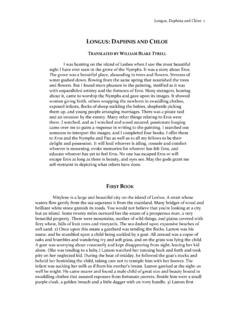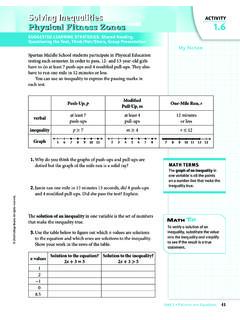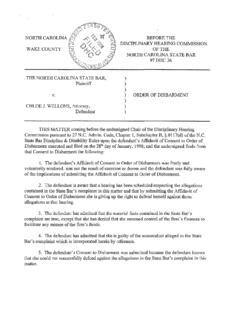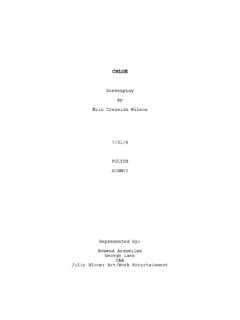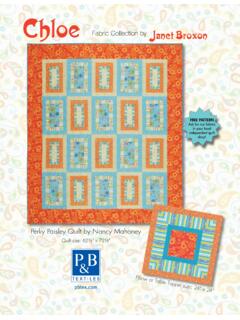Transcription of house of Chloe, that there are contentions among you.
1 Mustard Seed Children's Ministry Sunday School Lesson for June 4, 2006 Released on June 1, 2006 "Getting Along with One Another" GOLDEN TEXT: "I beseech you, brethren, by the name of our Lord Jesus Christ, that ye all speak the same thing, and that there be no divisions among you" (1 Corinthians 1:10). SCRIPTURE LESSON TEXT (1 Corinthians 1:10-17): 10 Now I beseech you, brethren, by the name of our Lord Jesus Christ, that ye all speak the same thing, and that there be no divisions among you; but that ye be perfectly joined together in the same mind and in the same judgment. 11 For it hath been declared unto me of you, my brethren, by them which are of the house of Chloe, that there are contentions among you.
2 12 Now this I say, that every one of you saith, I am of Paul; and I of Apollos; and I of Cephas; and I of Christ. 13 Is Christ divided? was Paul crucified for you? or were ye baptized in the name of Paul? 14 I thank God that I baptized none of you, but Crispus and Gaius; 15 Lest any should say that I had baptized in mine own name. 16 And I baptized also the household of Stephanas: besides, I know not whether I baptized any other. 17 For Christ sent me not to baptize, but to preach the gospel: not with wisdom of words, lest the cross of Christ should be made of none effect. LESSON OBJECT & TRUTHS TO STRESS: Teach that God wants all His children to work and play together in harmony.
3 Biblical examples can be used to show how believers should cooperate with each other. God is pleased when nothing - not wealth, race, clothes, possessions, ability, or different backgrounds - keeps us from cooperating with others who love Jesus. PLANNING LESSON AIDS: For "Helping to Remember," each child will need a sheet of light blue construction paper. They will draw a circle to represent the earth. Supply a marking pen, crayons, and scissors. Two activities are provided at the end of the lesson. Use these or other age-appropriate activities. BEGINNING THE LESSON: This week's lesson uses the problem of division in the Corinthian church to stress the importance of God's people getting along with one another and being united as one in Christ Jesus.
4 Children can be shown examples of division (separating into groups) from their own experience. Although their dividing seldom involves following one leader over another, they do divide or group themselves on the basis of likes and dislikes. They are quick to consider some boys and girls too tall, too fat, too clumsy, or to have some other "problem," and the in-group rejects them on that basis. Some children are considered to have the wrong skin color. Others do not meet "proper" dress standards. Still others live in poor housing, come from the wrong neighborhood, or have a family living situation that deviates from the norm. A child may even be rejected because he rides a rickety bicycle.
5 Use these examples or others like these to introduce the lesson to the children. Like most boys and girls, Christian children will be tempted to withdraw from certain children over matters such as these. Let us prayerfully teach our children, as Paul taught the believers in Corinth, that we are all one in Christ Jesus, and there are certain Christian graces that we, as believers in Christ, should manifest toward others. LESSON BACKGROUND: The Apostle Paul was gifted and inspired by the Holy Spirit to write 13 of the 27 books of our New Testament. Paul's original writings were letters to individuals or churches to encourage, instruct, or to address and correct problems.
6 Our lesson this week comes from the book of 1 Corinthians, which was written to the body of believers living in Corinth. Corinth was a large city, and the church faced many problems. Paul wrote to the church to address some of the problems going on in the church after receiving a disturbing report from someone in the house of Chloe, who was a member of the Corinthian church. Paul's first concern for the church was for them to get along with each other - that they be unified and not divided. Paul addressed the preference for different leaders, since this appeared to be the source of the division. Some claimed to be followers of Paul; others claimed to be of Apollos; still others of Cephas; and some of Christ.
7 Paul urged them to unite as followers of Christ since the church should be united as one body, with Christ Jesus as the Head. TELLING THE LESSON: 1. What does "beseech" mean (1 Corinthians 1:10)? "Beseech" means to beg someone to do something that is very important and to do it immediately. Paul uses this word in the beginning of his letter to the church people at Corinth. Paul was telling God's people to do their best to take care of something, starting right then. 2. Why did Paul write to the believers in Corinth (1 Corinthians 1:10-11)? Paul had received a disturbing report from someone in the household of Chloe, a member of the Corinthian church. He wrote this letter to them to address some of the problems that he heard were going on in the church.
8 The first problem that had to be addressed is covered in this week's lesson - division among the people of God. Paul wrote to remind the people of the importance of getting along together, being united as followers of Christ and not divided. 3. How did the people use their favorite leaders to divide themselves into groups (1 Corinthians 1:12-13)? The people in Corinth, just as people today, had preferences for different leadership figures. The people allowed their desire for their favorite leader to split the church body. Some were claiming to be followers of Paul himself. Some had formed a Cephas (Peter) group. Others had aligned themselves with Apollos, who was "well versed in the scriptures " (Acts 18:24) and was popular among some of the Corinthians.
9 These different groups in the church body were not proper. Paul reminded the believers that the church is in Christ. Christ is the head, and we are His body. All believers in the church should be united as one in Christ Jesus. 4. What did Paul urge the Corinthian believers to do (1 Corinthians 1:10)? Paul urged the believers to all speak the same thing and not to be divided. His desire for them was that they all be joined together in the "same mind" and the "same judgment" as followers of the Lord Jesus Christ. Paul did not want them to divide in groups and say, "Paul is our leader" or "Peter is our leader" or "Apollos is our leader." He did not want them to divide themselves but to all recognize that they were all followers of Christ, and Jesus was the leader of them all.
10 5. Why was Paul glad that he had only baptized a few people (1 Corinthians 1:14-17)? Because of the divisions in the church at Corinth, Paul was thankful that he had baptized only a few in the church (Crispus, Gaius, and the household of Stephanas). He was thankful for this because no one could claim that Paul had baptized in his own name. Paul reminds them that Christ is not divided - so none should be claiming that they were followers of anyone but Christ Jesus - who was crucified for them and in whose name they were baptized. 6. Name examples from the bible (Biblical characters) that demonstrate the way God's people should cooperate and get along. The Bible is filled with examples or models of how God's people should cooperate with each other despite any differences that may exist between them.
